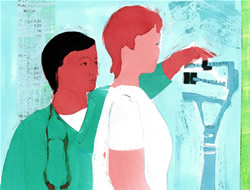Who's Who on Your Hospital Team:
First and foremost, each patient has a nurse assigned to him or her at all times - 24 hours a day, seven days a week. The nurse works closely with your doctor to oversee and coordinate your care. Even when your nurse is on break, there is a nurse assigned to be responsible for your safe care. The nurse develops a plan for each of his or her patients and leads a team who help with your care. Below is a list of the other professionals who may help your nurse and doctor deliver care to you based on your individual needs. Any questions about your care should be directed to the nurse or to the nurse manager.

The Nursing Team:
-
Nurses
Your assigned Registered Nurse (RN) will be most involved in your day-to-day care and oversee all aspects of your stay. There are various kinds of nurses, all of whom are licensed professionals with different levels of training and specialization. Your nurse may call on other staff nurses to help with your care, such as evaluation or treatments. -
Nurse Manager
The Nurse Manager oversees all the care on a particular unit. The nurse taking care of you is supported by the nurse manager. -
Staff Educator
These nurses serve as educational resources to staff, giving them the latest information about medication, treatments or technology. -
Clinical Nurse Specialist (CNS)
Clinical nurse specialists have Masters degrees in a specialty and provide teaching and support to patients in their particular area of knowledge. - Nurse Practitioner (NP)
A Nurse Practitioner is a registered nurse who has completed additional courses and specialized training. They can diagnose and treat illnesses in their specialty. Some nurse practitioners can prescribe medications. They work under the supervision of a physician.
Other Team Members:
Nurses aren’t the only professionals caring for you. Here are examples of some of the others who may be part of your care team:
- 1:1 Patient Observer
A patient observer is like a sitter and maintains constant watch over a single patient for safety reasons.
- Clinical Pharmacist
A clinical pharmacist participates directly with the health care team and influences the quality and safety of medication use in a variety of ways. These may include: making rounds on the patient units, reviewing medication orders for safety, providing recommendations, consulting on patient discharge medications and educating patients.
- Dietitian
A Registered Dietitian (RD) is a food and nutrition expert who provides dietary support, counseling and/or education to patients, family and/or nurses to ensure appropriate nutritional care.
- Hospitalist
Hospitalists are doctors who specialize in caring for hospitalized patients. They can focus all their attention on managing the care of patients inside the hospital, including coordinating and consulting with your other doctors, and keeping you and your family informed.
- IV Therapy Team/Line Access
This team is available to put in IV lines and to troubleshoot IV placement issues.
- Intensivist/Neonatologist
These specialized doctors are located in the critical care units to support and direct the care of critically ill adults and newborns.
- Intern/Resident
Medical school graduate doctors who are gaining supervised practical or specialized experience in a hospital setting may be part of your caregiving team.
- Licensed Social Services / Case Management
These staff are healthcare professionals who help patients deal with crisis, cope with their illness, solve problems, enhance communication with members of the healthcare team and access hospital and community services.
- Patient Transport Team
These staff take patients and their equipment to and from tests, procedures and appointments within the hospital.
- Physician Assistant (PA)
PAs provide diagnostic, therapeutic, and preventive health care services, with supervision from physicians. They should not be confused with medical assistants, who perform routine clinical and clerical tasks.
- Rapid Response Team
In some hospitals, this team of clinicians provides critical care expertise and responds to a patient’s bedside to assist with a serious change in a patient’s condition and if appropriate, a change in treatment.
- Recreation/Milieu Therapist
Recreation/Milieu Therapists provide planned activities that support the care of the patients on hospital units--most often in psychiatric settings.
- Rehabilitation Activities
Physical therapists (PT), speech and language pathologists, and occupational therapists (OT) and their assistants are available to provide individual or group therapy to individual patients based on the specific needs of each patient, with a focus on resolving or improving the functional status of those patients.
- Occupational Therapy (OT) is skilled treatment that helps individuals achieve independence in all facets of their lives.
- Physical therapists (PT) spend their time focusing on the large motor groups that contribute to walking, reaching, standing and physical activities.
- Occupational Therapy (OT) is skilled treatment that helps individuals achieve independence in all facets of their lives.
- Respiratory Therapy
These individuals perform testing and provide respiratory treatments to diagnose and manage the care of patients with lung and breathing problems. They also monitor and maintain respiratory equipment, and provide patient education.
- Unlicensed Assistive Personnel (UAP)
Includes nursing assistants, orderlies, patient care technicians / assistants, and graduate nurses not yet licensed who have completed unit orientation.
